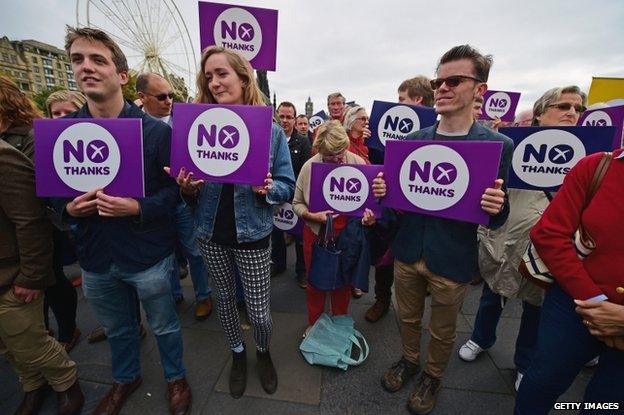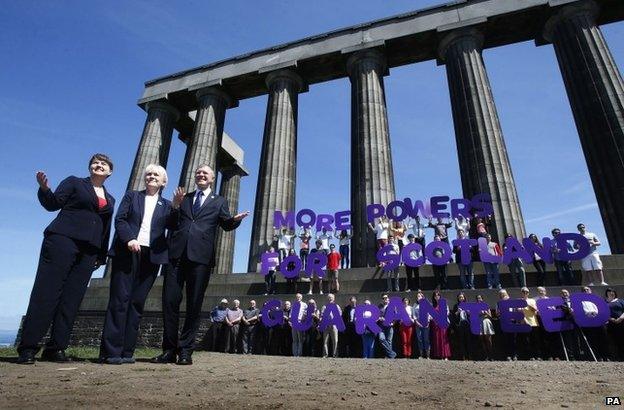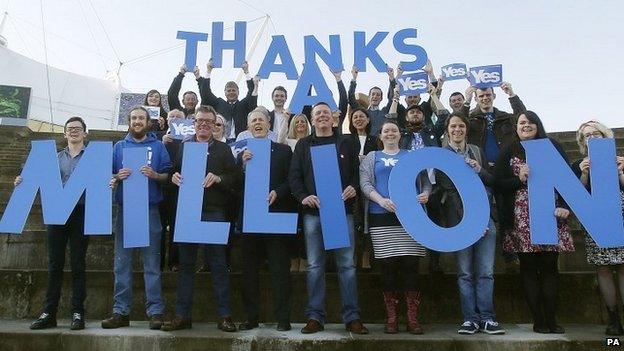Together, yes - but scarcely chums
- Published

The Better Together campaign faces a series of challenges
It may not be outright panic. But it is hardly calm, measured insouciance either.
Better days may - or may not - return for Better Together but, right now, it is scarcely glad confident morning.
The reason? TOP, that opinion poll. You know, the one by YouGov in the Sunday Times which suggested that the "Yes" campaign might win this referendum.
At the core of the Better Together campaign, a series of interlinked challenges.
Firstly, they are seeking to negate a proposition, that of independence. They are saying "No". They are advocating a "No" vote.
The challenge is to say "No", positively. To project an upbeat vision of the continuing and reformed Union while talking up the downside of independence.
Independence alternative
Secondly, they may be Together - but they are scarcely chums. Indeed, Labour, the Liberal Democrats and the Tories will soon be clutching each warmly by the throat in the UK General Election.
That creates a temptation to diss their comrades as well as their opponents.
It is a temptation which particularly grabs Labour - who argue that the alternative to independence is not just the reformed Union but said Union with Labour in charge.
After ousting the Tories.

Pro-Union parties set out plans for more powers on Edinburgh's the Calton Hill
Hence comments from Ed Miliband contrasting his party's individual prospectus with that of the SNP. Hence suggestions from inside Labour that, if Scotland votes "No", they want to claim that victory for their party, not for the consensual campaign.
Thirdly, if Better Together is to project an alternative, what will it be? The version of enhanced devolution offered by the Tories? Or the Labour scheme? Or maybe the LibDem vision?
Lack of time and the pre-existence of inter-party competition (see above) pre-empted the prospect, never very serious, of a single, united offer emerging from the pro-Union side.
Now, the parties know they need to stress their unity, rather than their division. Hence the promise of announcing further details of the process by which further powers for Holyrood would emerge.
Venn Diagram
Expect that in the next day or two. Not, incidentally, as a UK government announcement - not least because the UKG is in voluntary purdah with respect to the referendum.
Rather, this will be an endeavour by the pro-Union campaign to draw out the Venn Diagram of overlap in their existing offers, to set up a body to finalise and promulgate these plans in the event of a "No" vote, linked to a repeated pledge to guarantee implementation, regardless of the UK General Election outcome.
In its composite parts, we know all or most of this. We already know the party offers.

The Yes Scotland campaign believe its opponents have largely deployed their big hit
The Scottish Secretary Alistair Carmichael has already signalled plans for a forum to convene within a month of the referendum. And we have the Calton Hill declaration setting out plans for legislation.
So where now? Expect that powers process.
Expect a strengthened "emotional" appeal (we love you, Scotland, please don't go.) And expect also a more voluble statement of the claimed risks involved in independence.
From the "Yes" side?
They believe their opponents have largely deployed their big hits. They believe those are increasingly being discounted by the voters.
They believe that, if they can get a "score draw" over the economy in the media air war, that they can win on the ground with an aspirational, upbeat message.
As ever, the voters . . . but then you know that by now.